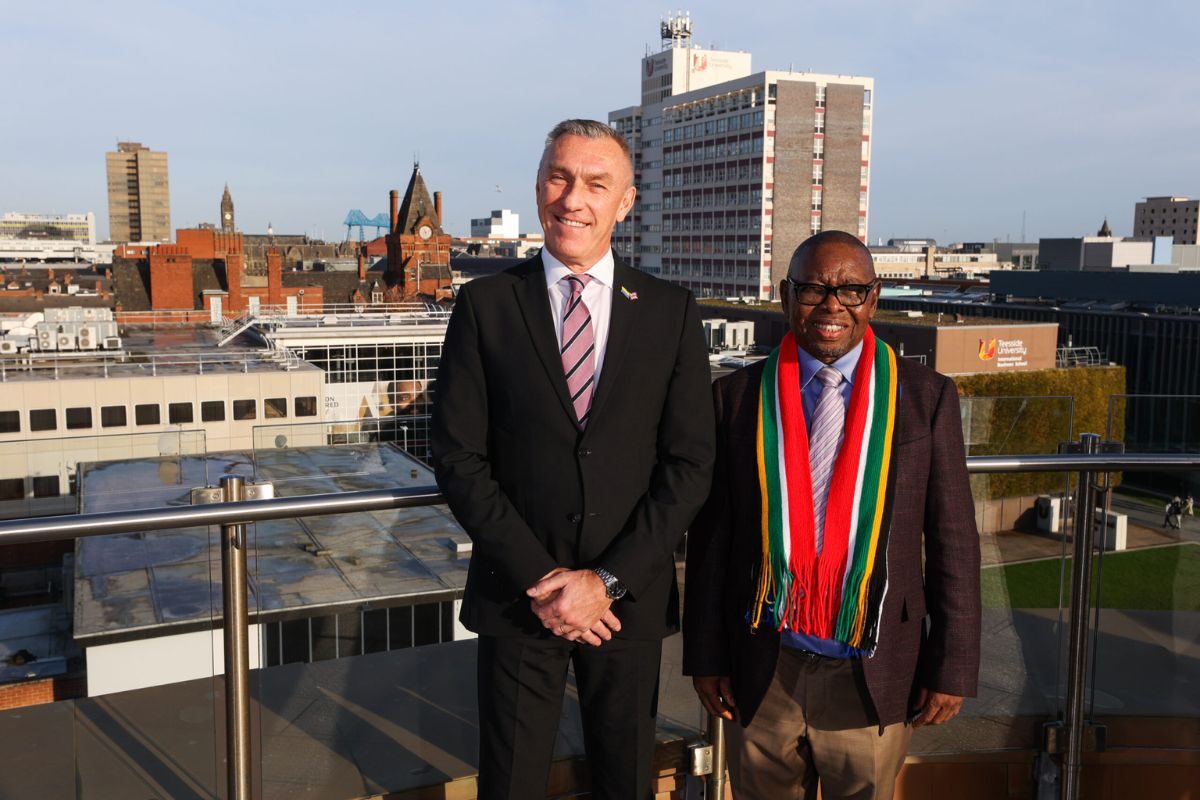Teesside University collaborates with South Africa in Hydrogen Research

A delegation of senior South African government officials has visited Teesside University to learn about how it is helping the Tees Valley transform into a global hub for Net Zero technologies.
The delegation, led by South African Minister for Higher Education, Science and Technology, Blade Nzimande, was visiting the region as part of the state visit to the UK by the South African president Cyril Ramaphosa.
The work to create a hydrogen hub in the Tees Valley parallels similar plans to create a South African Hydrogen Valley.
In taking forward this co-operation, the South African government has been working closely with the UK2070 commission which has produced a 10-point plan to support regional growth across the UK.
Teesside University is at the forefront of the Tees Valley region’s efforts to build a regional hydrogen economy working with industry partners.
The UK2070 Teesside Task Force has recommended the University should be the driving force behind a Global Centre of Excellence based around bioscience, the zero-carbon economy and the potential of green steel.
In parallel with the visit by the South African delegation, Teesside University will conclude an agreement with South Africa’s Stellenbosch and Pretoria Universities deepening UK-South African academic collaboration on hydrogen, including academic co-operation and exchange, sharing best practice and leveraging funding opportunities.
Next year, will see the opening of its £13.1 million Net Zero Industry Innovation Centre which will be central to the Tees Valley Combined Authority’s regional innovation strategy, positioning Teesside firmly at the heart of the UK’s green industrial revolution.
Teesside University’s Vice-Chancellor and Chief Executive, Professor Paul Croney, OBE, said:
“I was delighted to welcome our guests from South Africa to Teesside University.
“As an institution which is global in its outlook, we were pleased to showcase the breadth of our ambition to firmly establish the Tees Valley at the heart of the green revolution.
“Through partnership working we are committed to driving forward innovation and investment in new green technologies.
“We look forward to working with our partners in South Africa to deliver against our shared vision of delivering a just transition for all.”
Professor Stephen Cummings, Pro Vice-Chancellor (Research and Innovation), added:
“Here at Teesside University we are working to establish the Tees Valley region as a globally competitive, climate-friendly hub for industry, research and innovation.
“Our research strategy is tailored to finding new and disruptive technologies to help forge a smarter, greener industrial economy.
“The NZIIC will be central to this mission and the potential for future knowledge exchange and collaboration with our counterparts in South Africa offers tremendous opportunities to delivering industry-focused solutions to combating the climate emergency.”
Lord Kerslake Chair UK2070 Commission said:
“The UK2070 Commission is pleased to be able support this initiative by Teesside University.
“The Commission’s work has highlighted the importance of harnessing the potential of universities in seeking solutions to the deep social and economic challenges that we all face.
“Today, is a practical demonstration of what can be achieved by such collaborative action.”
Jason Martin, Director of Turner & Townsend said :
“Green hydrogen has the potential to make a huge contribution to social and economic growth globally, particularly as we face the current challenges around energy security and inflationary headwinds.
“Our teams in the UK and South Africa have been working to unlock opportunities with Teesside University, wider academia, the business community and government departments – in their respective markets to advance this aim.
“The continued success of this hydrogen mission represents an important step towards realising this goal and fully aligns with Turner & Townsend’s commitment to driving the growth of productive and resilient and productive net zero economies.”











Responses